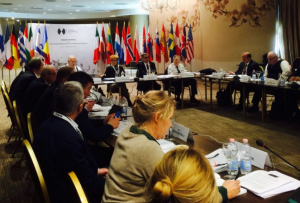NEWS IHRA Denounces New Polish Legislation
Poland, as a member of the International Holocaust Remembrance Alliance is committed to the Stockholm Declaration, IHRA’s funding document that was the outcome, in 2000, of a forum attended by the representatives of 46 governments. And the principles of the Stockholm Declaration are clear, the first point being “The Holocaust (Shoah) fundamentally challenged the foundations of civilization. The unprecedented character of the Holocaust will always hold universal meaning”.
IHRA, formerly known as Task Force for International Cooperation on Holocaust Education, Remembrance and Research, or ITF, unites governments and experts to strengthen, advance and promote Shoah education, research and remembrance, and with its 31 member countries states that international political coordination is imperative to strengthen the moral commitment of societies and to combat growing Holocaust denial and antisemitism.
The Stockholm Declaration continues reminding that the magnitude of the Shoah, planned and carried out by the Nazis, must be seared in collective memory, and that the international community shares a solemn responsibility to fight those evils. Promoting education, remembrance and research about the Shoah, both in those countries that have already done much and those that choose to join the effort, sharing the commitment to encourage the study of the Shoah, and taking all steps to facilitate the opening of archives in order to ensure that all documents are available to researchers.
With this principle it’s all too obvious that Ambassador Benno Bättig, Chair of the International Holocaust had signed an appeal to Polish President Duda to reflect on the comments from the international community and to consider the implications of the legislation that the Polish Senate has passed reminding him his Nation’s commitment to encourage the study of the Shoah in all its dimensions and to uphold its truth against those who would deny it.
Even stronger have arrived the words of Professor Yehuda Bauer, IHRA’s Honorary Chairman, who’s stressed that “Poland is an essential part of the IHRA, and the relations within the IHRA with Polish colleagues have been, at all times, absolutely excellent. But the Polish government must make up its mind: for freedom of inquiry, research, publication, the right to err as well as the right to be right, or against it, and that means against the Stockholm Declaration and against the IHRA.”
After reminding IHRA’s mission, professor Yehuda Bauer – a respected authority on the subjects of the Shoah, on antisemitism (a word he insists has to be written unhyphenated) and on the Jewish resistance – reminded that the contested legislation deals with at least three distinct issues: one is the opposition to calling the concentration and death camps in Poland in World War II “Polish” camps, which is, in his words, a justified and obvious demand: they were German camps on occupied Polish soi, with no Polish guards, only Polish prisoners and victims. But no serious academic or politician or government would object to this Polish demand. Polish government’s insistent repetition of a demand that is accepted seems to hide the real purpose of the legislation, which is to attack free research on the Shoah in Poland.
Than, he continues, the legislation criminalizes anyone who claims that the Polish nation or State was responsible for the crimes perpetrated on Polish soil during the war, which is an odd argument: there could be no act of the Polish nation or State on Polish soil during the war, because Poland was occupied and terrorized by a foreign power, and it is true that contrary to other countries, there was no Polish political collaboration with Nazi Germany.
“The central point is the question of Polish-Jewish relations on occupied Polish soil during the war: establishment historians in Poland argue that the Polish people tried to rescue the Jews and present the Polish nation as a nation of rescuers, which is a blatant lie”. Bauer stresses that people in Poland went out to hunt down and kill the Jews who tried to escape, or handed them over to the Polish police who fully collaborated with the Germans, or handed them over to the Germans directly, all over the Polish countryside. Polish participation in the murder of Jews was widespread. The rescuers – who existed – had to protect Jews not only from the Germans, but also in many cases from their Polish neighbors. But no Jew in Poland could survive without some help from Poles.
And Bauer continues: “The legislation is designed to make research of this difficult and complicated subject impossible: it supposedly protects scientific and artistic works from criminalization. But who determines what such works are? What about an investigative journalist? An aspiring but not (yet?) recognized artist? Or a tourist guide explaining how the local population gleefully robbed the property of the Jews as they were being herded to be murdered? Or a simple B.A. student writing a seminar paper and asking for material at an archive – when they submit their paper, will they then serve 3 years in jail because they found that a group of villagers murdered their Jewish neighbors?”.
In such an atmosphere, there can be no free research or publication, it is an authoritarian and illiberal climate that is opposed, openly and courageously, by Polish historians, not solely around the Polish Center for Holocaust Research who re-published a declaration that is a very strong opposition to the legislation. And the governmental policy is also opposed by the director of Polin, the museum of Polish Jewry in Warsaw.
IHRA, says Bauer, should demand with all possible force that this kind of legislation is annulled because it cannot be recognized by any civilized society.

